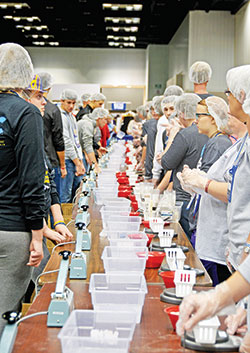National Catholic Youth Conference 2017
Service project helps ‘impact a country in Africa from Indiana’

In the Indiana Convention Center in Indianapolis during the National Catholic Youth Conference, volunteers prepare to make pre-packed meals on Nov. 18 to be sent to Burkina Faso as part of a conference-long service project to help Catholic Relief Services’ Helping Hands program. (Photo by Natalie Hoefer)
By Natalie Hoefer
Eric Devine stood in the Indiana Convention Center in Indianapolis carefully measuring scoops of rice for pre-packaged meals.
Someday, more than 5,300 miles away in Burkina Faso, someone will not starve because of the meals he helped prepare.
“I think it’s really cool that we can impact a country in Africa from where we are in Indiana,” said the teen of St. Christopher Parish in Indianapolis. “We’ll probably never be able to see them, but we’ll be able to know that we were able to help.”
He and other members of his parish’s youth group were among the 3,000 youths, chaperones and youth ministry leaders who prepared bagged meals for the Helping Hands program—formed of a partnership between Catholic Relief Services and Rise Against Hunger—during the National Catholic Youth Conference (NCYC) in Indianapolis on Nov. 16-18.
By the end of NCYC, 100,000 meals were prepared to send to the West African country.
Why Burkina Faso?
“It’s very arid there, so people trying to grow food there, it makes it really difficult,” said Rachael Holmes, program manager for Helping Hands. “So we try to send relief, which is the meals that people are packaging … and that’s going to directly impact the people in Burkina Faso.”
But the assistance doesn’t stop with sending meals.
“We’re doing long term development projects, so hopefully they’ll have a future free from hunger,” Holmes explained. “We want them to be sustainable on their own.”
The funds are used for purchasing seeds and water infrastructure for irrigating fields. Helping Hands also offers job skill training such as sewing, raising livestock and how to grind grain—“ways that they can make money on their own,” says Holmes.
An example she cites is a project the program initiated in a town in Burkina Faso.
“We got a group of 120 farmers—men and women—and taught them how to plant a crop that was better during the dry season, and that was actually onions. We worked with them to bring in a water pump and piping so they could pipe the water into their land. The first crop was like four tons of onions they were able to harvest.
“From the funds that came from the U.S., all the people we were able to work with had an impact on this whole community. They’re sending all their kids to be educated, and that impacts their future.”
Participants at NCYC took to the concept of making a difference as they gathered around bag-filling and -sealing stations in 45-minute shifts, including 10 minutes of education about the project, whom it serves, why and how.
“It was a really great opportunity to help people out,” said Mary Snyder of the Diocese of Trenton, N.J. “This service project is helping other people, not just giving them food … so it’s like the whole ‘teach a man to fish’ versus ‘give a man a fish’ thing.”
Julia Galate of the Diocese of Orlando, Fla., said she participated in a service project recently, “and I fell in love with the idea of being able to be hands-on and do some work, not just talking about doing good. This was a great opportunity to do so.”
Jessica Watson of the Archdiocese of Washington couldn’t agree more.
“I get to do something good—I love it!” she said enthusiastically. “I really love doing something for the community, and knowing that I’m helping people outside my small community is the best feeling!”
Comments like these are rewarding to Holmes.
“We love to hear that response!” she said. “We hope they leave thinking about the people in Burkina [Faso], and the fact that they don’t have food every day.
“It’s a fun energetic thing, and it shows just how much service you can give in a little amount of time.”
(For more information on the Helping Hands project or how to conduct one in your school or parish, go to
helpinghands.crs.org.) †
(See all of our NCYC 2017 news coverage here)
